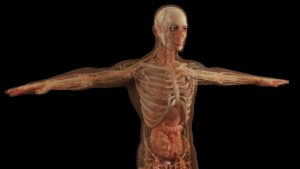Peripheral neuropathy is a condition that affects the peripheral nervous system, which includes the nerves outside of the brain and spinal cord. Depending on which nerves are affected, it can cause a wide range of symptoms. Early detection is crucial for effective management and treatment of peripheral neuropathy. In this blog post, we will explore the first symptoms that may indicate the presence of peripheral neuropathy, empowering you to seek timely medical attention at Elevation Health, where our specialized team can help diagnose and manage this condition.
Numbness and Tingling Sensations
One of the earliest and most common signs of peripheral neuropathy is numbness and tingling in the affected areas. This sensation is often described as a “pins and needles” feeling or a loss of sensation. It can occur in the hands, feet, legs, or arms and may progress gradually over time. If you notice persistent tingling or numbness in any of these areas, it’s important to consult with a healthcare professional for an evaluation.
Sharp or Burning Pain
Peripheral neuropathy can also manifest as sharp, shooting, or burning pain in the affected nerves. This pain may be intermittent or constant and can vary in intensity. It often starts in the toes or fingers and gradually spreads upward. Individuals with peripheral neuropathy may experience pain that worsens at night, making it difficult to sleep. If you’re experiencing unexplained and persistent pain, it’s essential to seek medical attention to identify the underlying cause.
Muscle Weakness and Difficulty Moving
As peripheral neuropathy progresses, it can lead to muscle weakness and difficulty with movement. You may find it challenging to perform simple tasks like buttoning a shirt, gripping objects, or walking steadily. Weakness in the affected areas can contribute to coordination problems and an increased risk of falls. If you notice a decline in your muscle strength or difficulty with basic movements, it’s crucial to consult with a healthcare professional promptly.
Sensitivity to Touch
Another symptom of peripheral neuropathy is hypersensitivity or increased sensitivity to touch. Even light touches or clothing brushing against the affected area can cause discomfort or pain. This heightened sensitivity can make daily activities challenging and uncomfortable, such as putting on shoes or socks. If you experience abnormal sensitivity to touch, it’s important to have it evaluated by a healthcare professional to determine if peripheral neuropathy is the underlying cause.
Changes in Reflexes
Peripheral neuropathy can also affect your reflexes. You may notice that your reflexes have become diminished or absent in certain areas of your body. This can be particularly evident in the knee and ankle reflexes. If you observe any changes in your reflexes, it’s advisable to consult with a healthcare professional for further examination.
Balance Problems and Coordination Difficulties
As peripheral neuropathy progresses, it can lead to balance problems and coordination difficulties. You may feel unsteady on your feet or experience frequent stumbling or tripping. The loss of sensation in the feet and legs can impair proprioception, making it harder to maintain balance. If you’re experiencing difficulties with balance or coordination, it’s important to seek medical attention to identify and address the underlying cause.
Temperature and Sweating Changes
Peripheral neuropathy can disrupt the autonomic nervous system, which controls involuntary functions like temperature regulation and sweating. As a result, you may notice changes in your body’s ability to regulate temperature. Some individuals with peripheral neuropathy may experience excessive sweating, while others may have difficulty sweating at all. These changes can lead to discomfort and an increased risk of overheating or not noticing injuries due to lack of perspiration. Consulting with a healthcare professional can help determine if peripheral neuropathy is responsible for these symptoms.
Peripheral neuropathy is a complex condition that can significantly impact an individual’s quality of life. Recognizing the early symptoms of peripheral neuropathy is crucial for early intervention and effective management. If you or someone you know experiences any of the symptoms discussed in this blog post, it’s important to seek medical attention promptly. At Elevation Health, our specialized team is dedicated to diagnosing and treating peripheral neuropathy, providing comprehensive care to help individuals regain control over their lives.
Early detection of peripheral neuropathy allows for timely intervention and the implementation of appropriate treatment strategies. Depending on the underlying cause, treatment options may include medication, physical therapy, lifestyle modifications, and pain management techniques. Our team at Elevation Health will work closely with you to develop a personalized treatment plan tailored to your specific needs and goals.
It’s also important to note that various factors, including diabetes, autoimmune disorders, infections, exposure to toxins, and certain medications can cause peripheral neuropathy. Understanding the underlying cause of your peripheral neuropathy is vital for developing an effective treatment approach.
In addition to seeking professional medical care, there are steps you can take to manage the symptoms of peripheral neuropathy and improve your overall well-being. These include:
- Practicing good foot care: Keeping your feet clean, dry, and moisturized can help prevent complications such as infections and ulcers.
- Engaging in regular exercise: Physical activity, under the guidance of a healthcare professional, can help improve circulation, strength, and balance, reducing the risk of falls and further complications.
- Maintaining a healthy lifestyle: Eating a balanced diet, managing blood sugar levels (if applicable), avoiding smoking, and moderating alcohol consumption can contribute to better overall health and potentially slow down the progression of peripheral neuropathy.
- Managing stress: Stress can exacerbate symptoms and contribute to discomfort. Engaging in stress-reducing activities such as meditation, yoga, or deep breathing exercises can help alleviate symptoms.
Protecting yourself from injuries: Since peripheral neuropathy can impair sensation and coordination, it’s important to take precautions to prevent injuries. This may include wearing proper footwear, using assistive devices for walking if necessary, and creating a safe environment at home.
Remember, early intervention is key to managing peripheral neuropathy effectively. By recognizing the first symptoms and seeking professional help, you can take control of your health and improve your overall well-being. At Elevation Health, our team is here to support you every step of the way on your journey to living a fulfilling and pain-free life with peripheral neuropathy. Don’t hesitate to reach out and schedule an appointment to receive the care and expertise you deserve.
Disclaimer: The information provided in this blog post is for educational purposes only and should not replace professional medical advice. It is always recommended to consult with a healthcare professional for accurate diagnosis and personalized treatment plans.



